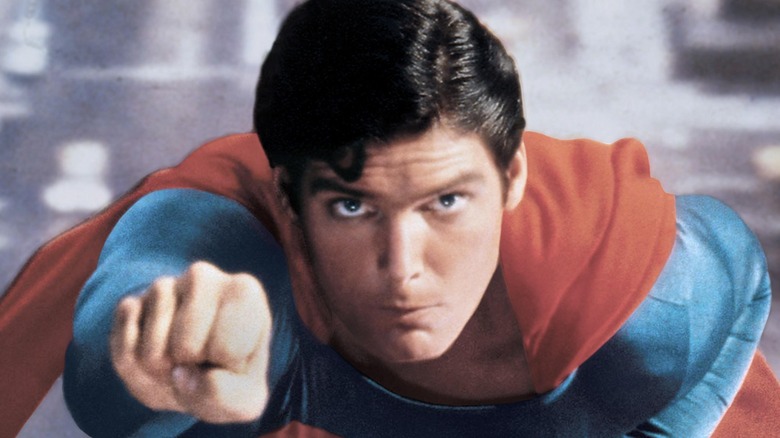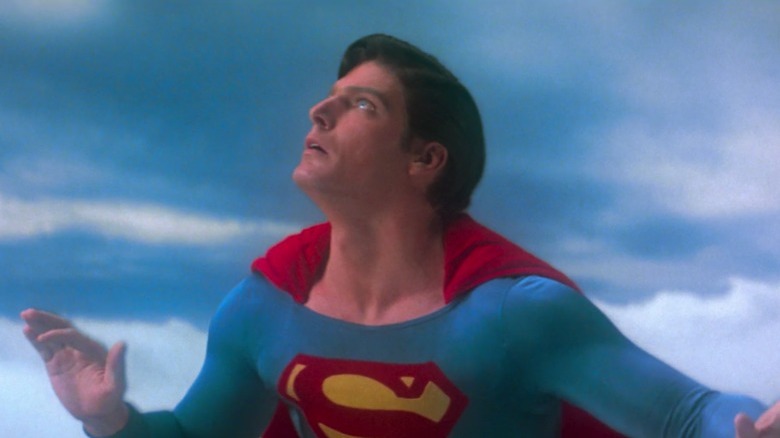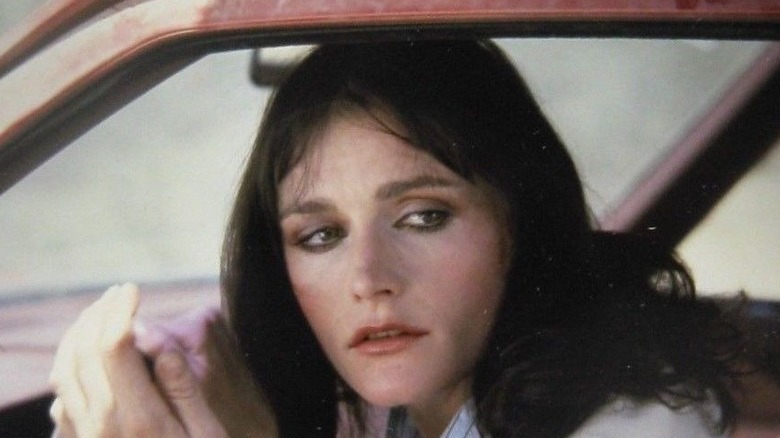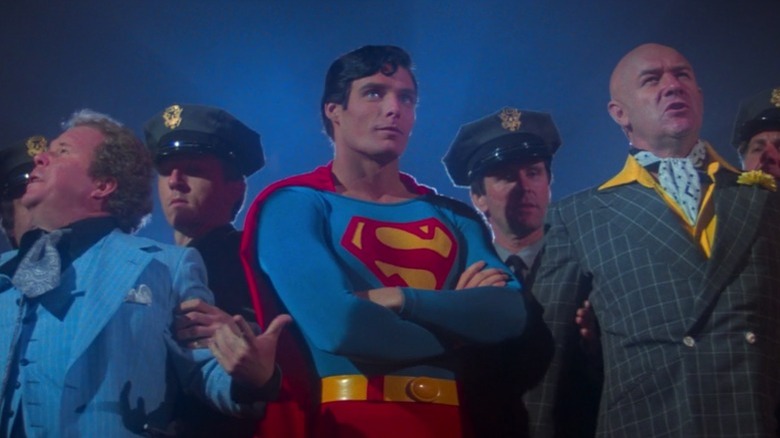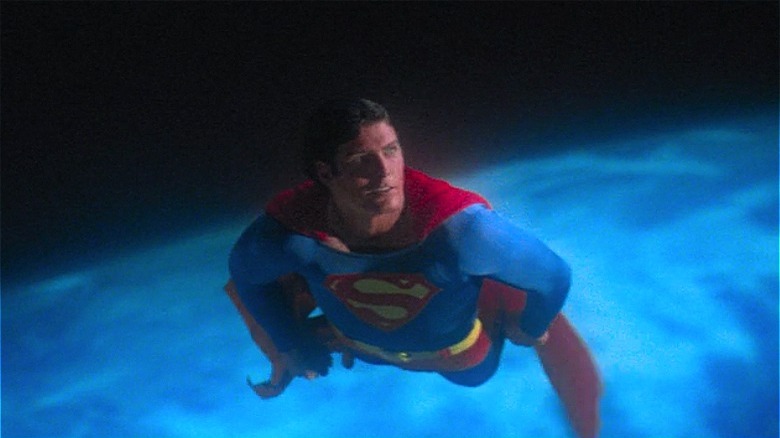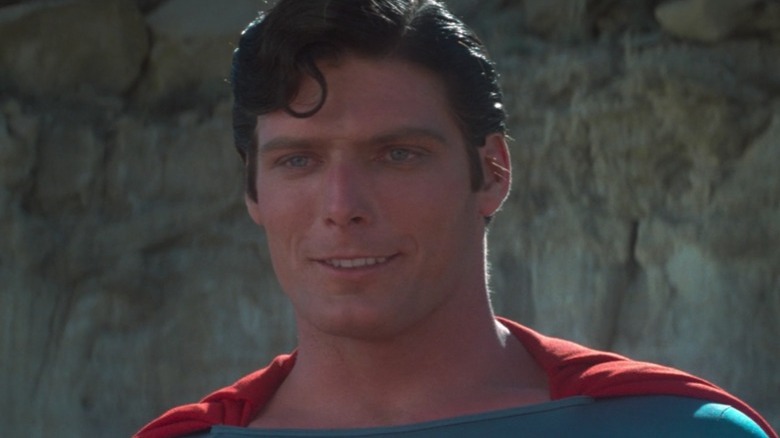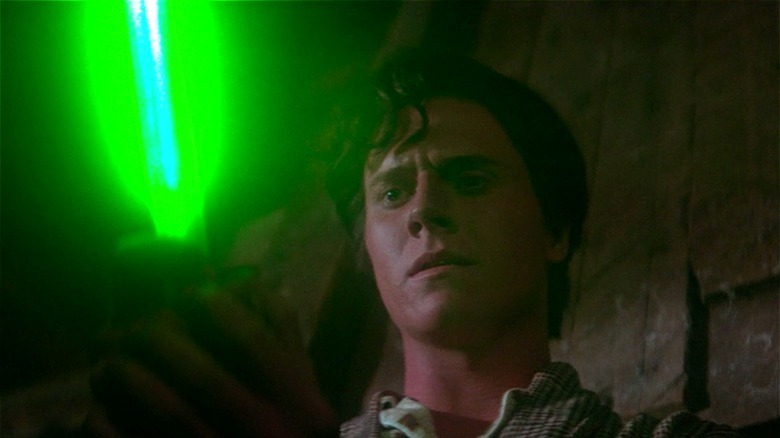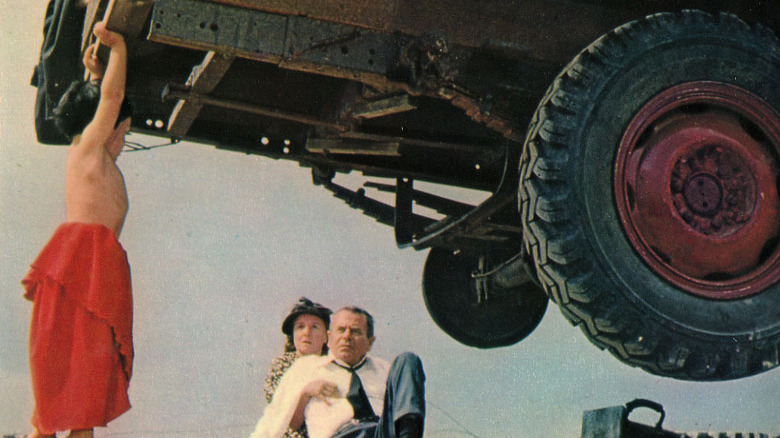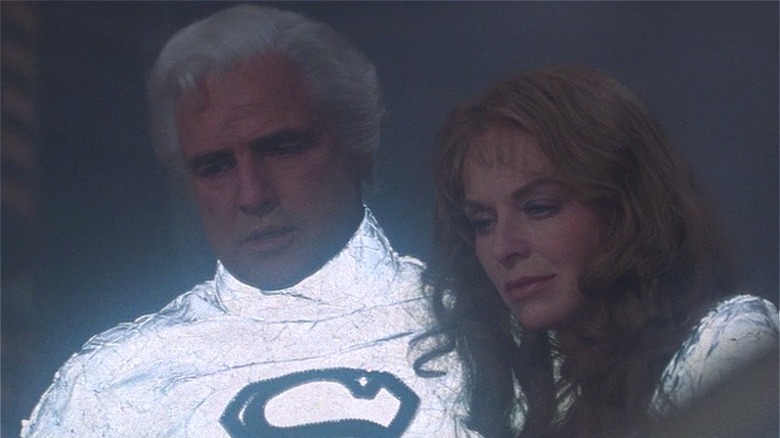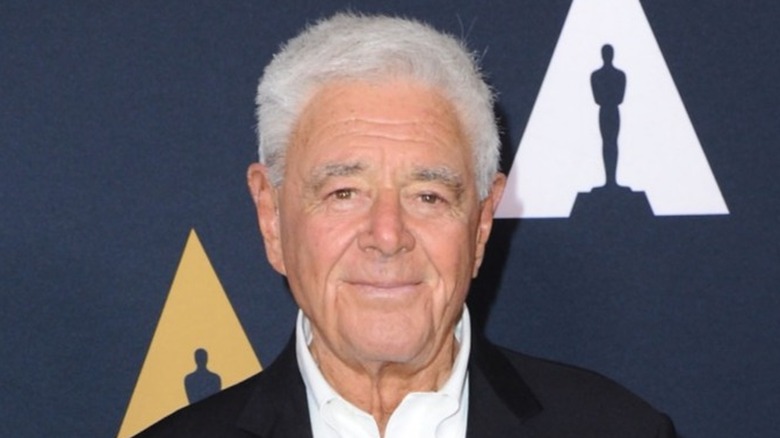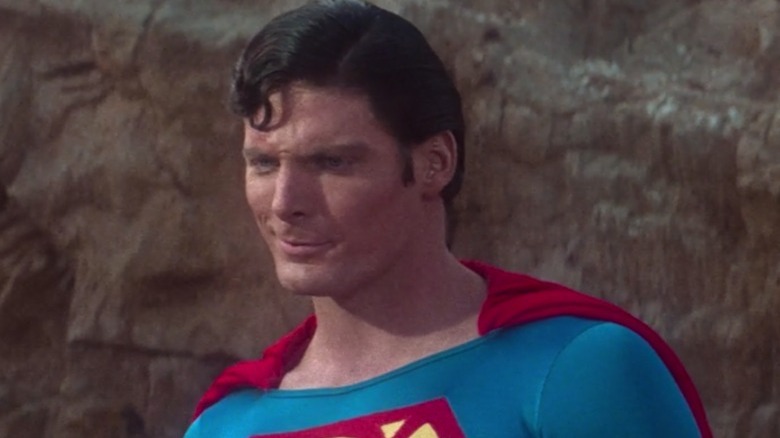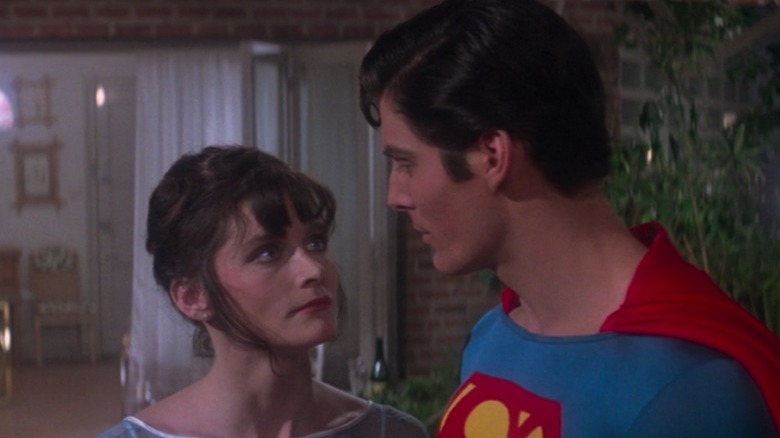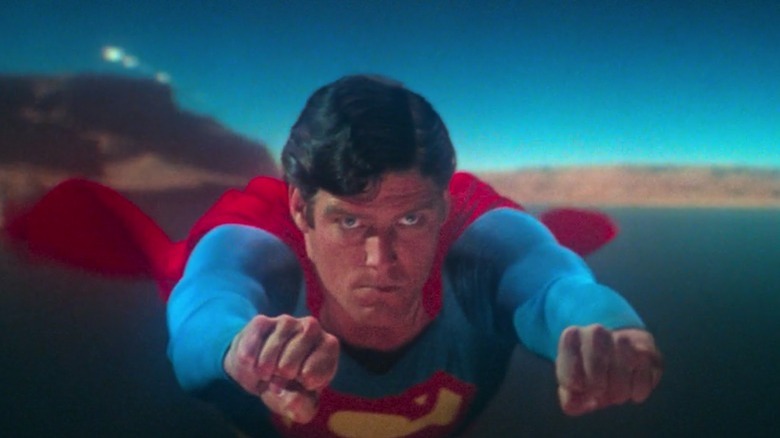The Ending Of 1978's Superman Explained
Look! Up in the sky! Is it a bird? Is it a plane? Of course, it's the original cape-sporting superdude himself, Superman, the titular hero of director Richard Donner's 1978 classic superhero film. With Christopher Reeve as the Man of Steel, alongside Marlon Brando, Margot Kidder, Gene Hackman, Ned Beatty, Jackie Cooper and others, Donner's film combined inspired casting, innovative special effects, and myth-minting screenwriting to create a template for the modern superhero film.
Superman the character may make leaping tall buildings in a single bound look easy, but "Superman" the movie took years to come together, with multiple script and story changes and much behind-the-scenes drama involving various producers and directors. In fact, "Superman" and its sequel "Superman II" were filmed simultaneously, an uncommon filmmaking practice at the time that erupted into much drama behind the camera. Directors were fired and hired, endings were changed — but in the end, captivated audiences came to believe a man could fly.
Activate your x-ray vision for a (spoiler-heavy) breakdown of the ending — and the drama surrounding — the original Richard Donner "Superman" film.
Superman reconciles being of two worlds
Superman is a nearly omnipotent, yet torn between two worlds. He's simultaneously an alien from Krypton with a litany of powers and just a guy from Smallville who wants to be popular.
As the film recounts, young Kal-El is sent to Earth by his father Jor-El as planet Krypton faces imminent destruction. Found and raised by Pa (Glenn Ford) and Ma (Phyllis Thaxter) Kent, little Kal-El becomes Clark Kent (Jeff East). While Pa Kent discourages his son from showboating his amazing capabilities, he lovingly tells Clark he's on Earth for an important reason. When Pa dies, Clark is saddened that despite all his powers, he couldn't save Pa's life. He then seeks out his Kryptonian roots, where a holographic Jor-El bestows upon Clark the infinite knowledge of the cosmos. Jor-El explicitly forbids him from using his powers to meddle with human history, setting up the character's central, unceasing moral predicament.
While saving others from Lex Luthor's scheme to destroy California (that oceanfront property would be worth a lot of dough), Superman can't save Lois Lane (Kidder) from being killed in an earthquake. Yet again, he fails to save the person he loves. Distraught and in a moral quandary, he recalls both the words of Jor-El and Pa Kent, and Superman chooses the latter. In a famous, much-discussed third act plot point, Superman orbits the Earth and reverses its rotation, thus turning back time and saving Lois' life.
By changing human history with his powers, Superman proves that he can be both a Kyptonian force and an emotional Earthly being. When he tells the prison warden "We're all part of the same team," it's an acknowledgement of his newfound identity.
Lois Lane seemingly figures out Superman's secret identity
Lois Lane, ace Daily Planet newspaper reporter, mixes business with pleasure when she falls in love with Superman. Her exclusive night flight with Supes not only makes the front page, but it's also a flirty rendezvous. Sparks fly between Superman and Lois as they glide through the cityscape and she quickly falls in love with him, an ethical dilemma for any impartial journalist. Of course, it doesn't hurt that her meek colleague Clark Kent is actually her interview subject. Equally smitten, Clark nearly reveals his identity to her after their interview date, but reluctantly keeps the secret.
While on assignment, Lois is crushed to death by falling rocks. Superman, pained by the loss of his love, uses his powers to reverse her fate. When Superman flies away after saving her, Lois wonders why Clark and Superman are never in the same place at the same time. She dismisses the thought as a silly idea, but viewers know her hunch is spot-on. Even news photographer Jimmy Olson (Mark McClure) sees Superman cares about his colleague. Deep down, Lois recognizes that Superman and Clark Kent are one in the same, but she's not quite ready to confront the possibility. No amount of investigative reporting will give her the answer she knows in her heart is true, but it's safe to say she'll eventually make the deadline.
Justice is served for Lex Luthor and Otis
Criminal mastermind Lex Luthor (Hackman) is bent on pulling off the greatest real estate swindle of all time. With the help of his bumbling henchman Otis (Ned Beatty) and girlfriend Eve Teschmacher (Valerie Perrine), he wants to blow California off the map by launching missiles into the San Andreas Fault, thereby making his low-value land into a prime coastal locale. But when Superman flies into Metropolis with his do-gooding ways, Luthor sees him as the ultimate threat to his plan. He would love to destroy everything Superman represents.
Luthor discovers Superman's only weakness is Kryptonite, a radioactive substance that while harmless to humans, proves lethal to Kryptonians. Luthor sources some of the mineral, straps it to Superman, and leaves him to die. But Eve, distraught by Luthor's missile heading directly toward her mother's house, frees Superman. Miss Techmacher might have a change of heart, but clearly Luthor does not, doubling-down on his villainous plot. He almost gets away with it, too, but Superman snags Luthor and Otis, depositing the dastardly duo in the penitentiary. Luthor defiantly serves notice that he will not be confined to the prison walls as he is dragged away to his cell. While justice is served to Luthor, a little jail time is just a temporary obstacle for him to overcome. Luthor is seemingly the only person who knows Superman's Kryptonite fragility, and no doubt he will continue to weaponize it against Superman once he's out of jail.
What the end credits reveal for Superman's future
"Superman" not only closes with a sweeping reprise of the film's title march, but for viewers willing to sit through the extensive credits, it also includes a little surprise about the saga's future. It took a slew of talented technicians and crew members both in front of and behind the camera to get "Superman" off the ground. All deserve their acknowledgements and it takes nearly eight minutes for the movie's final moments to whizz through the celestial credits. For those who watch "Superman" to the end, you'll find a simple teaser for the next installment of the franchise. The last words to appear on the screen are "Next year 'Superman II.'" No other details are revealed about the sequel, other than confirming it was in the works.
Indeed, as detailed in the documentary "Making Superman: Filming a Legend," "Superman" and "Superman II" were filmed simultaneously with plans for back-to-back releases, but all didn't quite go according to plan. According to The New York Times, the release of "Superman II" was orchestrated by Warner Bros. to maximize the film's profit. In a then-unprecedented move, the studio opened the film globally in late 1980 before its U.S. debut in the summer of 1981. This was meant to control possible bad publicity for "Superman II" and to align with each country's peak filmgoing habits. Even Superman, who can control space and time with his otherworldly powers, couldn't defeat the forces of Hollywood's bottom line.
Why Superman ultimately stole its ending from Superman II
Superman circles the world, reversing the Earth's rotation to reverse time, thus saving Lois Lane from her death. As thrilling a finale as this is, it wasn't the film's original ending. Richard Donner detailed "Superman's" planned finale in Cinefantastique magazine, which planned to reintroduce the villainous General Zod to the movie.
In this intended ending, the rocket Superman hurled into space to save Earth would collide with The Phantom Zone, freeing Zod, Non, and Ursa. They would then wreak havoc on a moon mission and set course for Earth.
As it would turn out, filmmakers did a little time manipulation of their own, taking the ending of "Superman II" and using it instead for "Superman." Both movies were shooting simultaneously, and according to the documentary "You Will Believe: The Cinematic Saga of Superman," the focus turned to completing "Superman" in order to make its summer 1978 release goal. Creative consultant Tom Mankiewicz shared that Warner Bros. wanted the spectacular special effect of the Earth reversing for the "Superman" finale. The studio feared if "Superman" failed at the box office, there would be no "Superman II," leaving the most spectacular special effect on the cutting room floor. Mankiewicz changed the ending, the request was accommodated, and the rest is movie history.
Superman and The Hero's Journey
"Superman" follows the hero's journey, a blueprint popularized by writer/scholar Joseph Campbell in his 1949 mythological dissection "The Hero With a Thousand Faces." The hero's journey, also known as the monomyth, has been integral to the storytelling of some of Hollywood's most-beloved tales, including "Star Wars," "Harry Potter," and "The Lord of the Rings." As laid out by Master Class, the hero's journey traditionally consists of three stages: The departure, the initiation, and the return, and the story structure of "Superman" reflects these stages.
In act one, Baby Kal-El departs his home planet of Krypton, jettisoned to Earth by his parents to not only save his life, but to help humanity. Act two sees Kal-El, now known as Clark Kent, growing up in Smallville U.S.A, where he's initiated in the ways of adolescent strife. Eventually, he receives the prize of intergalactic knowledge from his late father, gaining the wisdom of his superpower. The final act of "Superman" sees Superman's return to civilization, integrating himself into Metropolis in order to help humanity against evil-doers.
The original script was very different
The original script for "Superman" was very different from what soared onto cinema screens in 1978. Penned by Academy Award-winning screenwriter Mario Puzo, hot off the "Godfather" movies, the initial screenplay for "Superman" was over 500 pages.
"It was gigantic, it was extraordinary," producer Ilya Salkind says in the documentary "You Will Believe: The Cinematic Saga Of Superman." "It was an absolute saga."
After several drafts, Puzo was out and further rewrites were made by David Newman, Leslie Newman, and Robert Benton. When "The Omen" filmmaker Donner was approached to direct, he would say years later, the script was not up to his standards.
"It was indulgent and heavy and had no point of view and treated [the comic books] with disrespect," the outspoken director told The Hollywood Reporter in 2016. "I was like, 'Man, if they make this movie, they are destroying the legend of Superman.' I wanted to do it just to defend him."
He joined the project, and with the help of screenwriter Tom Mankiewicz, he made drastic changes to the story. Out were campy pop culture references that would feel hopelessly dated today (like Superman mistaking Lex Luthor for 1970s lollipop-sucking detective Kojak) and bizarre behaviors such as Luthor munching on tissues, and in was Donner's signature "verisimilitude."
"This is American tradition," Donner would say of his duties. "We had to keep the history and the purity of the piece."
Superman as religious allegory
In "Superman," Kryptonian patriarch Jor-El delivers his only son to Earth as a beacon of hope for a flawed humanity. After spending 12 years isolated in the Fortress of Solitude, accumulating galaxies of knowledge from his father, Clark Kent (aka Kal-El) is ready to serve Earth by stirring hearts with his leadership. If this all sounds familiar, that's because "Superman" has many narrative similarities to the story of Jesus, as told in The New Testament. In Script Magazine, "Superman" creative consultant Tom Mankiewicz plainly identified the film's story arc thusly: "it is God sending Christ to Earth."
The religious overtones of "Superman" were not welcomed by some moviegoers; Donner even received death threats.
"One woman wrote a letter saying how dare I compare Brando to God and Christopher Reeve to Jesus," he recalled in 20201. "She said my blood would run in the streets. I guess you make a good movie, somebody takes it as a reality."
While subsequent film adaptations of the character, like 2013's "Man of Steel," would attempt to water down the 1978 film's religious allegory, it has always been there. Per The Guardian, Warner Bros. created special marketing material for the Henry Cavill film to "educate and uplift your congregation," encouraging pastors to utilize it in their sermons.
"Superman's mythical origins are rooted in the timeless reality of a spiritual superhero who also lived a modest life until extraordinary times required a supernatural response ... Jesus was sent by his Father to bear our burdens, to right our wrongs, to rise above our troubling circumstances," read the promotional materials. "How might the story of Superman awaken our passion for the greatest hero who ever lived and died and rose again? Let's consider how Superman's humble origins, his high calling and his transforming sacrifice point us towards Jesus, the original superhero."
How Richard Donner's 'verisimilitude' philosophy shaped Superman
For "Superman" director Richard Donner, making the film as believable as possible was of paramount importance. Donner centered the word "verisimilitude" in his filmmaking process. Dictionary.com defines verisimilitude as "the appearance or semblance of truth" and Donner told Variety of his creative philosophy, "I have my own sense of verisimilitude when it comes to each and every project," adding, "It's a reformation, to a degree, of Method acting principles transformed for directing: Find the reality. I look for the reality in the situation, rather than the farce."
When cameras began rolling on "Superman," it was Donner's idea of verisimilitude that centered the production. In the documentary "Making Superman: Filming a Legend," Donner said he hung a sign in his office of Superman flying while holding a "verisimilitude" banner in hand because "the story had to have its own honesty, it had to be real." Per The Hollywood Reporter, Donner understood the challenge of making audiences believe a man can fly, tossing out producers Alexander and Illya Salkind's flying tests and building his own special effects from the ground up. It was immense work, but Donner's dedication paid off. Not only does "Superman" convincingly make Christopher Reeve soar through the air, but its visual effects team won a special achievement award at the 51st Oscars for their efforts.
Behind-the-scenes drama impacted its sequel
When it comes to the Christopher Reeve Superman films, some of their most intense drama happened off camera.
The production of "Superman" and "Superman II" was a monumental undertaking, spanning both years and continents. It was driven by a then-massive $55 million budget, with the purse strings being held by the father/son duo of Alexander and Ilya Salkind. According to Ilya, the first two films would eventually balloon in cost to anywhere between $109 million and $140 million, and the degree to which the films were financially successful would result in lawsuits by everyone from Brando to Donner to Puzo — who alleged in part that the Salkinds conspired to deprive them of their revenue sharing.
The production of the two films — and where the first one ended and the second began — was fraught from the start. The relationship between Donner, the Salkinds and producer Pierre Spengler deteriorated to the point where they were no longer on speaking terms.
"I was making a movie and they wouldn't tell me the budget," Donner said of the situation in 2016. "So there was no way I knew what I was spending."
By the time the first movie was released, and became a hit, people like Variety columnist Army Archerd could smell a story brewing. Even though much of "Superman II" was in the can, who'd be finishing the sequel was suddenly up for debate.
"Army called Donner and said 'I spoke with Pierre Spengler and apparently now all is forgotten and you're going to go do 'Superman II' together.' To which Donner said 'Well, if he's on it, I'm not'," Spengler recalls in the "You Will Believe" doc. "And that was published, you can look in Variety if you look around the end of the year 1978, there it was. It created the atmosphere and the tension for us — by us I mean the Salkinds and I. The Salkinds are very loyal people; I'd been there from the outset. If the gentleman didn't want to work with me, then we had to find someone else to replace the gentleman."
Eventually, "Help!" director Richard Lester — known for his high energy, comedic sensibility — was brought in to fix "Superman II," changing the tone dramatically. While Lester delivered a popular film in "Superman II," it was a drastic departure from what Donner had envisioned. Decades later, Donner would be somewhat vindicated with a "Donner Cut" release that somewhat restored his original vision.
It launched the modern superhero movie
Before "Superman," superhero stories were mostly relegated to low-budget movie serials and small-screen escapades. Sure, Superman got the artistic touch with Max Fleisher's Oscar-nominated Superman cartoons in the 1940s, but subsequent years saw the Man of Steel perhaps most strongly associated with the television hit "Adventures of Superman" and star George Reeves' tragic, mysterious death. But kids who grew up on the Fleisher cartoons and Reeves "flying" on a plank would grow up to be the filmmakers of the '70s, and as writer/producer Bob Gale would later observe, they were ready to put their own cinematic spin on the genre.
"Superman" would ultimately gross $300 million at the global box office, and coupled with films like "Jaws" and "Star Wars," every Hollywood studio developed an insatiable hunger for their own blockbusters.
"It changed the paradigm and every major company said 'get me one of those'," recalls producer Peter Guber, who would go on to launch the next major cinematic superhero franchise with Tim Burton's "Batman."
Today, filmmakers from Christopher Nolan to Patty Jenkins cite "Superman" as a direct influence on their work; for all intents and purposes, Bryan Singer's 2006 reboot "Superman Returns" was a rehash of the Donner formula, and amidst all the current "is he/isn't he" brouhaha surrounding Henry Cavill, rumors have emerged that Warner Bros. — and professed 1978 "Superman" fan James Gunn — is eager to ditch the Zack Snyder-fueled self-seriousness and return the character to the tone of the 1978 film.
"Andy Muschietti, who directed 'Flash,' even expressed interest in sitting behind the camera for something that would have brought a tone similar to the hopeful and heroic colors of the 1978 movie," "The Hollywood Reporter" said in late 2022 of considerations for a potential "Man of Steel" sequel. "Directed by Richard Donner, [it is still] considered a benchmark in comic book movies."
"The Dark Knight" filmmaker Christopher Nolan shared with The Hollywood Reporter in 2015 that his love for "Superman" shaped the creation of his Batman trilogy; Jenkins said on Twitter that her "Wonder Woman" films have similar moments meant to evoke the Christopher Reeve films. Arguably, the Marvel Cinematic Universe also wouldn't be the same without "Superman"; "Still, to this day, [it is] the archetype of the perfect superhero film origin story and we watch it before we make almost any one of our films," said Marvel Studio head Kevin Feige in a 2017 tribute to Donner.
It's considered one of the best superhero movies
When "Superman" soared into in theaters in 1978, everyone seemed to have an opinion on whether or not the film would deliver on its tagline, "You'll believe a man can fly."
Variety's original review noted, "The risk, of course, was that the audience would refuse to believe and laugh in the wrong places." Famed reviewers Gene Siskel and Roger Ebert pondered on their show "Sneak Preview" whether or not "Superman" would live up to its blockbuster hype. However, both Variety and Siskel and Ebert gave "Superman" positive reviews, celebrating both the film's technical prowess and emotional heart. Ebert even praised "Superman" for "being one of the year's most refreshing comedies."
In the decades since the original release of "Superman," plenty of other films in the superhero genre have vied for greatness. Yet for all the expansion and diversity of the genre, "Superman" is still considered one of the best superhero movies of all time. Rotten Tomatoes ranks "Superman" at number eight on their list of "The 85 Best Superhero Movies of All Time" and Rolling Stone places it fifth on their "50 Greatest Superhero Movies of All Time." Not bad for a pre-CGI, script-fluid film that was not only laying down new rules, but often making them up as it went along.
